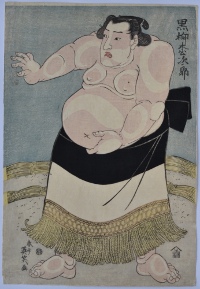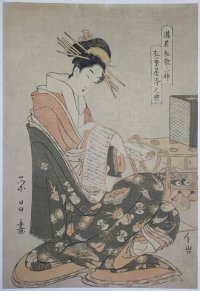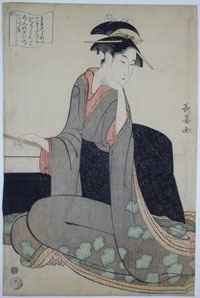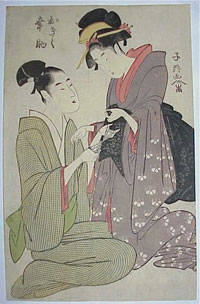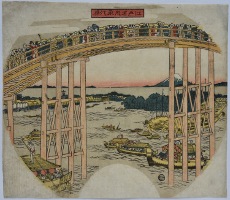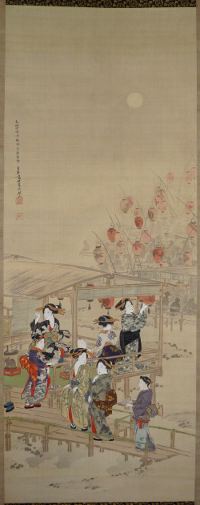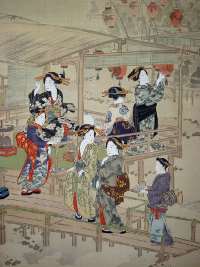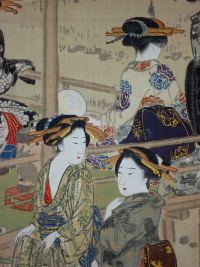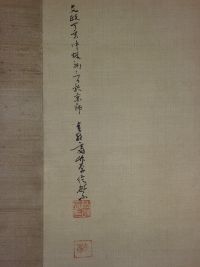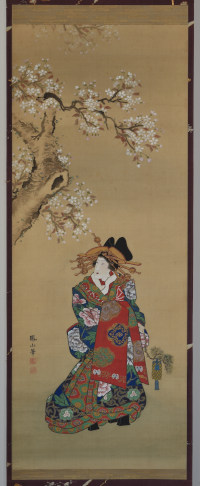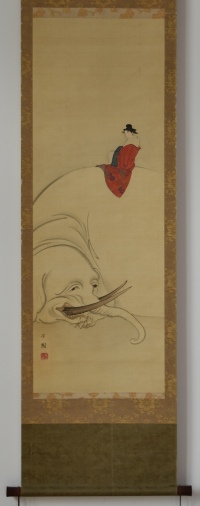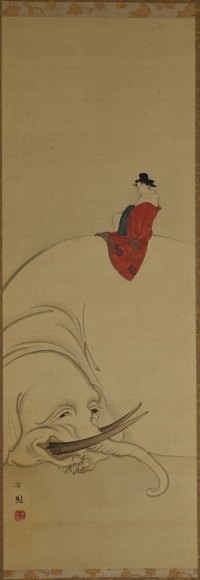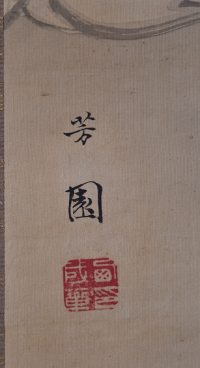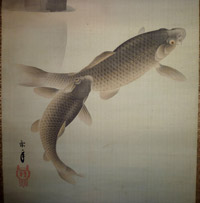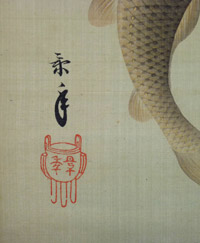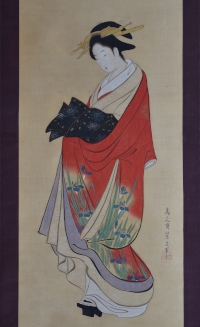Chokosai EISHO (Active 1780-1800)
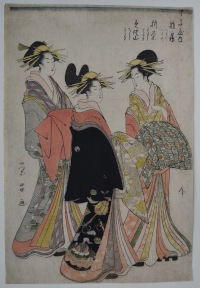
Click here to view image full size.
The courtesans Hinazuru, Origiku and Misayama of the Chojiya House. The most prolific of Eishi’s pupils who produced some outstanding bust portraits. Published by Yamaguchiya Chusuke, c late 1790’s. Another impression is in the Chazen Museum of Art, Madison, acc. no. 1984.215.
Very good impression and colour. There is a variant impression with different colours. Slight soil, otherwise good condition. Signed Eisho ga.
Status: Sold
Chokosai EISHO (active 1790s)
Click here to view image full size.
An aiban showing the seated courtesan Somenosuke of Matsubaya reading a hand scroll. From the set Kakuchu bijin-kisoi, “Three Patron Saints of Poetry in the Gay Quarters.” Eisho was the most successful of Eishi’s pupils. Published c 1790s by Yamaguchi Chusuke. Another from the set illustrated in A Treasury of Japanese Wood Block Prints, Sadao Kikuchi, no 694. Illustrated in Ukiyo-e Taikei, vol. 6, no. 216.
Very good impression and colour. Thinned area top border, otherwise very good condition. Signed Eisho ga.
Status: Sold
Eishosai CHOKI (Active c 1780–1810)
Click here to view image full size.
An elegant young entertainer beside her samisen box. Top left is a ballad that she presumably sang. While producing some mundane work, Choki also designed some of the most exquisite ukiyoe. Extremely rare: Another impression is illustrated in the Catalogue of Inaugural Exhibition of Riccar Art Museum, no. 42 and a second example is in the Tokyo National Museum, illustrated in A Treasury Of Japanese Wood Block Prints, Sadao Kikuchi, 1968, no. 640. Published by Tsuruya Kiemon, c 1795. Ex collection Walter von Scheven, 1878 – 1950, and purchased by him at Alfred Kappes, Ludwigshafen in 1925.
Fine impression. Very slight fading and minor fold marks, otherwise very good condition. Signed Choki ga.
Status: Sold
Eishosai CHOKI (Fl. c 1756-1808)
Click here to view image full size.
The lovers Okiku and Yosuke play cat’s cradle. ( A children’s game in which two players alternately take from each other’s fingers an intertwined cord so as always to produce a symmetrical figure.) Published c 1804 by Takatsuya Isuke. A similar print with same signature and publisher is illustrated in Sadao Kikuchi, A Treasury of Japanese Wood Block Prints, 1963, ill. No. 644 ( from the Tokyo National Museum ). I cannot, at the present moment, locate another impression of this design. Choki prints are rare and his finest designs are the most prized possessions of any collection. Ex collection Sidney C. Ward.
Very good impression with extremely good colour. Light grey ground. The cutting and colouring of the pattern on the boy’s kimono is particularly fine. Minor creases, otherwise extremely good condition. On heavy hosho. Signed [ Momogawa ] Shiko ga.
Status: Sold
Utagawa HIROSHIGE II (1826-1869)
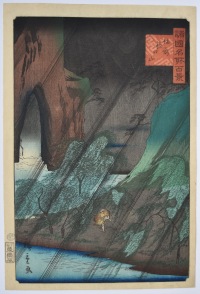
Click here to view image full size.
The Dragon’s Maw Mountain, Bizen Province, Bizen tatsu-no-kuchiyama from Shokoku meisho hyakkei, “Hundred Views of Famous Places in the Provinces.” An uncompleted set of 81 prints published by Uoya Eikichi between 1859-1861 (this being 1861). Shows a lone figure battling a heavy rainstorm in a steep-sided canyon.
Superb impression of the first edition. Fine colour and condition. Signed Hiroshige ga.
Status: Available
Utagawa HIROSHIGE II (1826-1869)
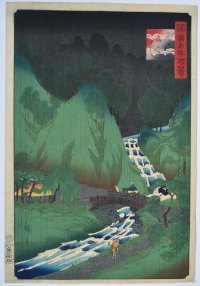
Click here to view image full size.
Mino Ochiai-bashi. Mino (Noshu) Province from Shokoku meisho hyakkei, “Hundred Views of Famous Places in the Provinces.” An uncompleted set of 81 prints published by Uoya Eikichi between 1859-1861 (this being 1861). An evening rain scene with figures making their way across the torrential Chitose River, famous for its fishing.
Superb impression of the first edition. Fine colour and condition. Signed Hiroshige ga.
Status: Available
Utagawa HIROSHIGE (1797-1858)
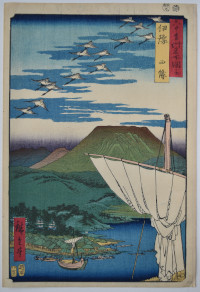
Click here to view image full size.
Iyo Province, Saijo. From a set of 69 prints [Dai Nihon] Rokujuyoshu meisho zue, “Famous Places in the Sixty-odd Provinces [of Japan]” published by Koshihei between 1853 and 1856, this being 1853. A large furled sail in the foreground with Saiju village on the water’s edge. Beyond is Mt. Ishizuchi.
Fine impression and colour. Light album backing, otherwise very good condition. Signed Hiroshige ga.
Status: Available
Utagawa HIROSHIGE (1797-1858)
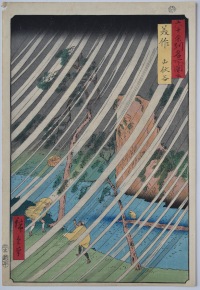
Click here to view image full size.
Mimasaka, Yamabushidani, “Mimasaka [Province], Yamabushi Valley.” Travellers caught in heavy wind and rain in the valley. Hiroshige II also produced an excellent version of this design. From a set of 69 prints [Dai Nihon] Rokujuyoshi meisho zue, “Famous Places in the Sixty-odd Provinces [of Japan]” published by b Koshimuraya Heisuke between 1853 and 1856, this being 1853.
Very fine impression and colour. Light album backing and very small wormhole at extreme edge of margin, top left, otherwise fine condition. Signed Hiroshige ga.
Status: Available
Utagawa HIROSHIGE II (1829-1869)
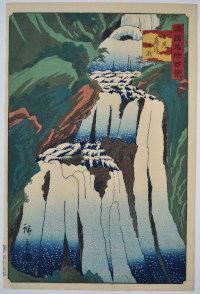
Click here to view image full size.
Nikko Shimofuri no taki, “Shimofuri Waterfall in Nikko” from Shokoku meisho hyakkei, “Hundred Views of Famous Places in the Provinces.” An uncompleted set of 81 prints published by Uoya Eikichi between 1859-1861 (this being 1859).
Fine impression, colour and condition. Signed Hiroshige ga.
Status: Available
Utagawa HIROSHIGE (1797-1858)
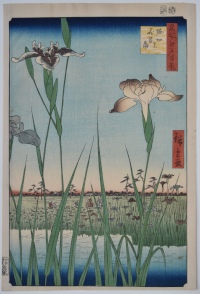
Click here to view image full size.
Horikiri no hana shobu, “Iris Garden at Horikiri” from Meisho Edo hyakkei, “Hundred Famous Views of Edo.” Published by Uoya Eikichi, 1856-58 (this being 1857). Horikiri village on the Arakawa River, north of Edo, was famous for growing irises, chrysanthemums, morning glory and azaleas for the Edo market. One of the most popular prints from the set. Provenance: Purchased from me in 2008.
Fine early impression. Fine colour and condition. Signed Hiroshige ga.
Status: Reserved
Ichiryusai HIROSHIGE (1797-1858)
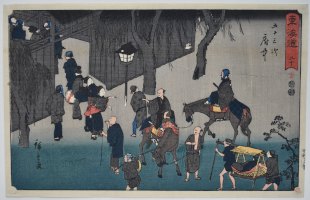
Click here to view image full size.
Fuchu from The Fifty-three Stations of the Tokaido published by Marusei, Maruya Seijiro, 1847-52. Called the Reisho Tokaido because of the angular style of Kanji used. Travellers coming and going at the entrance to the station. One of the best designs from the set. Provenance: Ex Hayashi collection with seal below title cartouche.
Fine impression and colour. Very good condition. Signed Hiroshige ga.
Status: Available
Utagawa HIROSHIGE (1797-1858)
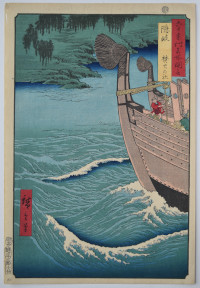
Click here to view image full size.
Oki Province, Takuhi Shrine. From a set of 69 prints [Dai Nihon] Rokujuyoshu meisho zue, “Famous Places in the Sixty-odd Provinces [of Japan]” published by Koshihei between 1853 and 1856, this being 1853. The prows of two boats near the island of Nishinoshima. A torii seen at the top of the print indicates the Takuhi Shrine, one of the most important shrines dedicated to the gods of the sea.
Fine impression and colour. Light album backing, otherwise very good condition. Signed Hiroshige ga.
Status: Available
Utagawa HIROSHIGE (1797-1858)
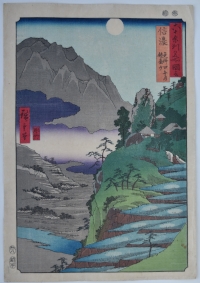
Click here to view image full size.
Shinano, Sarashina tagoto no tsuki, Kyodaisan, “Shinano [Province], the Moon Reflected in the Sarashina Paddy-fields, Mount Kyodai.” This was a popular destination for outings to view the multiple reflections. From a set of 69 prints [Dai Nihon] Rokujuyoshi meisho zue, “Famous Places in the Sixty-odd Provinces [of Japan]” published by Koshimuraya Heisuke between 1853 and 1856, this being 1853.
Fine, early impression. Fine colour and condition with large margins. Signed Hiroshige ga.
Status: Available
Utagawa HIROSHIGE II (1826-1869)
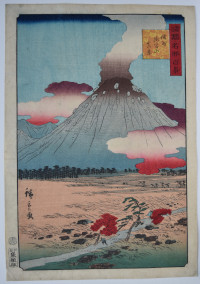
Click here to view image full size.
A view of a smoking Mt Asama, Shinano Province, from Shokoku meisho hyakkei, the “One Hundred Views of Famous Places in the Provinces.” Mt Asama is an active volcano which violently erupted in 1108. Subsequently there was another eruption in 1783 and since then there have been minor tremors. Published by Uoya Eikichi between 1859 and 1861 (this being 1859).
Fine impression, colour and condition. Signed Hiroshige ga.
Status: Available
Utagawa HIROSHIGE (1797-1858)
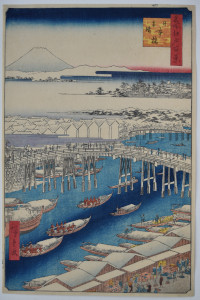
Click here to view image full size.
Nihonbashi yukibare, “The Nihon Bridge, Clear Weather After Snow.” From the set Meisho Edo hyakkei, “One Hundred Views of Edo.” The set published by Uoya Eikichi 1856-58 (this being 1856). The set comprises 118 prints by Hiroshige and another by Hiroshige II. However, three prints are dated 10/1858, the month following Hiroshige’s death and these are thought to be by Hiroshige II as well. They are: Ueno Yamashita, Ichigaya Hachiman and Bikunibashi. Number 1 from the set and a view of the Sumida River with Mt. Fuji in the distance. This is the starting point for the Tokaido Road.
Fine, early impression with gradation on the roofs and on Mt. Fuji. Fine colour. Margins trimmed a little, otherwise very good condition. Signed Hiroshige ga.
Status: Available
Utagawa HIROSHIGE (1797-1858)
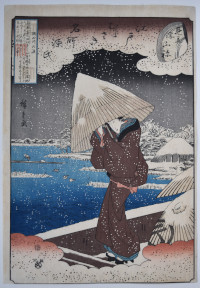
Click here to view image full size.
One of a set: Edo Murasaki meisho Genji, “Murasaki’s Genji in Famous Places of Edo.” Mitate Ukifune Sumidagawa no watashi, “A Parody of Ukifune Crossing the Sumida River.” Shows a beauty on a ferry crossing the Sumida River in heavy snow, representing Ukifune, one of the court ladies of the Genji Monogatari. Stylised clouds above and below copying the traditional kiri-gane gold found on Yamato-e scrolls. These Genji pictures were popular at this time to circumvent the reforms of 1842. Published by Kinseido (his seal also appearing on the umbrella bottom right). Rare.
Fine impression. Very good colour. Lower margin trimmed close, otherwise very good condition. Signed Hiroshige ga.
Status: Available
Utagawa HIROSHIGE (1797-1858)
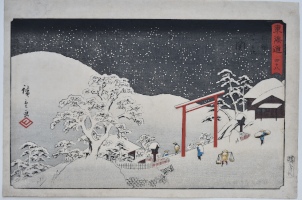
Click here to view image full size.
Seki from a Tokaido set published by Maruya Seijiro, 1850-51, hence it is often referred to as the Marusei Tokaido. Also known as the Reisho Tokaido because the title “Tokaido” is written in formal script. Below is the station number 48. Seki was located where the two highways of Tokaido and Ise-ji meet. Seki means “barrier checkpoint.” Figures pass beneath a torii gate on a snowy hillside.
Fine impression and colour. Minor edge soil, otherwise very good condition. Signed Hiroshige ga.
Status: Available
Utagawa HIROSHIGE (1797-1858)
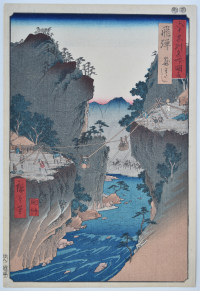
Click here to view image full size.
Hida, kago-watashi, “Basket Ropeway in Hida [Province]” from a set of 69 prints [Dai Nihon] Rokujuyoshi meisho zue, “Famous Places in the Sixty-odd Provinces [of Japan]” published by Koshihei between 1853 and 1856, this being 1853. Originating in China, Japan and northern India, travellers could cross deep ravines by suspending themselves in a harness which evolved into a basket.
Very fine impression and colour. Light album backing, otherwise fine condition. Signed Hiroshige ga.
Status: Available
Utagawa HIROSHIGE (1797-1858)
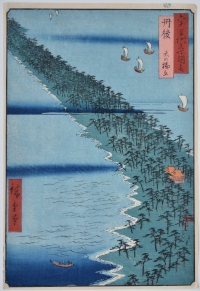
Click here to view image full size.
Tango, Ama no hashidate, “Tango [Province], Ama no hashidata” from Rokujuyoshu meisho zu, “Famous Views of the Sixty-odd Provinces” published by Koshimuraya Heisuke in 1853-56 (this being 1853). Shows the “Heaven’s Bridge” peninsula of pine trees extending into Miyazu Bay. One of the Nihon sankei, “Three Famous Views of Japan.”
ga.
Very good impression and colour. (The success of this print depends entirely on the bokashi clouds wiped across the design: Impressions vary depending on the dexterity of the printer.) Margins trimmed, otherwise very good condition. Signed Hiroshige ga.
Status: Available
Utagawa HIROSHIGE (1797-1858)
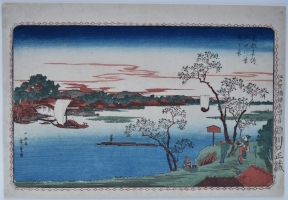
Click here to view image full size.
Sumidagawa hazakura no kei, “Cherry Trees along the Sumida River” from a Toto meisho “Famous Places in the Eastern Capital” set of ten prints published c 1831-2 by Kawaguchiya Shozo. Hiroshige’s first landscape set. The first editions, as here, have decorative borders adding a western element into the design. These were removed on later editions. There are also variant states with different shading. Rare.
Fine impression and colour. Backed, otherwise very good condition. Prints from this set are often missing or have the publisher’s name and address on the right border trimmed. Signed Ichiyusai Hiroshige ga. (The last set to be signed like this.)
Status: Available
Utagawa HIROSHIGE (1797-1858)
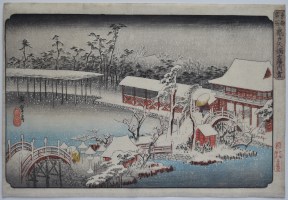
Click here to view image full size.
Kameido Tenmangu keidai no yuki, “The Compound of the Tenman Shrine at Kameido in Snow.” From a set of twenty-one prints Toto meisho, “Famous Views in the Eastern Capital” published by Sanoya Kihei, c 1834-5. The series was extended to fifty-five in c 1839-42. One of the most famous places in Edo. Known for its pergola, two drum bridges, koi ponds and the wisteria which flowered in the fifth month. The main shrine is dedicated to the memory of Sugawara no Michizane (Tenjin), the father of Japanese learning and built in 1662. The design comes in various states: Late editions have a black sky and the red publisher’s seal on right margin is replaced with an abbreviated Sanoki seal in black. Even later editions show a slipping plug becoming evident on the edge of the water, centre left.
Fine impression and colour. Probably the earliest printing. Slight trimming on right margin, otherwise very good condition. Signed Hiroshige ga.
Status: Available
v
Utagawa HIROSHIGE (1797-1858)
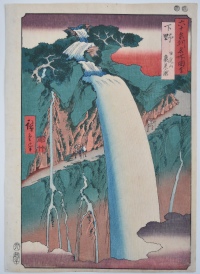
Click here to view image full size.
Shimotsuke Nikkosan urami no taki, “Back-viewed Waterfall on Mt. Nikko in Shimotsuke [Province].” From a set of 69 prints [Dai Nihon] Rokujuyoshi meisho zue, “Famous Places in the Sixty-odd Provinces [of Japan]” published by Koshihei between 1853 and 1856, this being 1853. Figures gaze up at the back of the waterfall which thunders over the path. It is also known with variant colour schemes. Fine design.
Very fine impression with strong blind-printing on the fall. Fine colour and condition. Full size. Signed Hiroshige ga.
Status: Available
Utagawa HIROSHIGE (1797-1858)
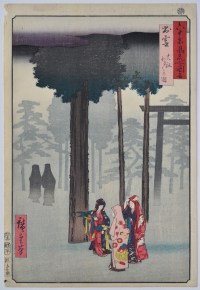
Click here to view image full size.
Izumo, taisha Hotohoto no zu, “Izuma [Province], Hotohoto Festival at Izumo Shrine.” Shows pilgrims to the oldest Shinto shrine in Japan. A heavy mist scene with the torii gate seen to the right. Every year from the 11th to the 17th day of the 10th lunar month (usually November) all Shinto’s deities from around Japan supposedly assembled here. It is also the shrine to visit in the hope of finding a partner. From a set of 69 prints [Dai Nihon] Rokujuyoshi meisho zue, “Famous Places in the Sixty-odd Provinces [of Japan]” published by Koshimuraya Heisuke between 1853 and 1856, this being 1853.
Very fine impression and colour. Light album backing and very small wormhole at extreme edge of margin, top left, otherwise fine condition. Signed Hiroshige ga.
Status: Available
Utagawa HIROSHIGE (1797-1858)
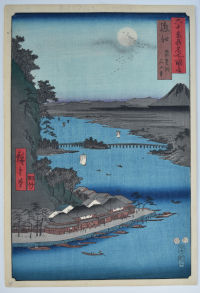
Click here to view image full size.
Omi, Biwako Ishiyamadera, “Ishiyama Temple and Lake Biwa in Omi [Province].”From a set of 69 prints [Dai Nihon] Rokujuyoshi meisho zue, “Famous Places in the Sixty-odd Provinces [of Japan]” published by Koshihei between 1853 and 1856, this being 1853. Moonlight on Lake Biwa is one of the iconic Eight Views of Omi.
Very fine impression and colour. Light album backing, otherwise fine condition. Signed Hiroshige ga.
Status: Available
Utagawa HIROSHIGE (1797-1858)
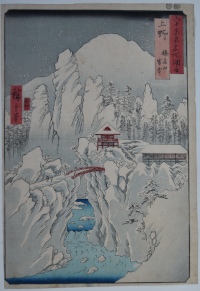
Click here to view image full size.
Kozuke, Harunasan setchu, “Kozuke [Province], Mount Haruna Under Snow.” From a set of 69 prints [Dai Nihon] Rokujuyoshi meisho zue, “Famous Places in the Sixty-odd Provinces [of Japan]” published by Koshihei between 1853 and 1856, this being 1853. A red bridge spans a gorge leading to the Buddhist Haruna shrine. Below is a fast flowing river with precipitous cliffs. Fantastic crags point upwards into the sky and in the distance is the dormant volcano Mount Haruna.
Good impression and colour. Slight soil on bottom left margin, otherwise good condition. Signed Hiroshige ga.
Status: Available
Utagawa HIROSHIGE (1797-1858)
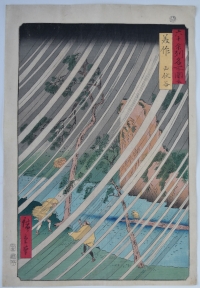
Click here to view image full size.
Mimasaka, Yamabushidani, “Mimasaka [Province], Yamabushi Valley.”A high wind and rain in the valley with a man on a raft on the Yoshi River. Other figures in the foreground, one having lost his hat. From a set of 69 prints [Dai Nihon] Rokujuyoshi meisho zue, “Famous Places in the Sixty-odd Provinces [of Japan]” published by Koshimuraya Heisuke between 1853 and 1856, this being 1853.
Fine, early impression. Fine colour and condition with large margins. Signed Hiroshige ga.
Status: Available
Utagawa KUNISADA (1786-1865)
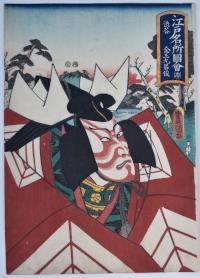
Click here to view image full size.
The actor Ichikawa Danjuro VIII as Shibuya Konnomaru Masatoshi from a set Edo meisho zue, “Famous Places of Edo.” This being Shibuya. Published by Iseya Chusuke 1852.
Very good impression. Good colour and condition. Signed Toyokuni ga.
Status: Available
Utagawa HIROSHIGE II (1826-1869)
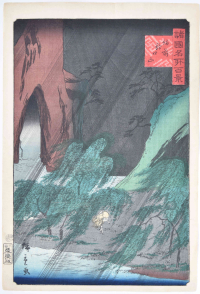
Click here to view image full size.
The Dragon’s Maw Mountain, Bizen Province, Bizen tatsu-no-kuchiyama from an unfinished set Shokoku meisho hyakkei, “One Hundred Views of Famous Places in the Provinces” published by Uoya Eikichi between 1859 and 1861 (this being 1860). Shows a lone figure battling a heavy rainstorm in a steep-sided canyon.
Fine impression, colour and condition. Signed Hiroshige ga.
Status: Available
Hosoda EISHI (1736-1829)

Click here to view image full size.
An original painting, sumi and colour on silk, 33.25 x 12 in; 84.5 x 30.5 cms. Shows a parading oiran, a high class courtesan, beneath falling cherry blossom. A parade was held every April in the Yoshiwara under the spring cherry blossom. Her costume is decorated with a large golden koi swimming amongst water weeds. An elegant and refined painting of great delicacy typical of this painter who was of unusually high rank for an Ukiyo-e artist. His prints – usually of beauties – are equally elegant. He also had a considerable number of pupils, including Eisho, Eiri and Eisui who produced some exceptional compositions. Probably painted around 1795-1804.
Mount with some minor damage; painted area in very good condition. Signed Chobunsai Eishi hitsu with Eishi seal.
Status: Available
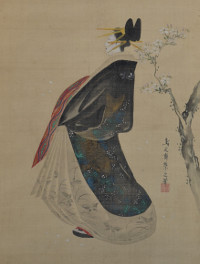
Click here to view image full size.
Utagawa SADAHIDE (1807-1873)
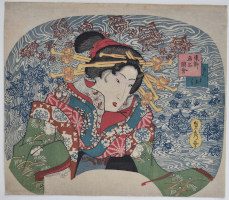
Click here to view image full size.
An uncut fan print showing a bust portrait of a courtesan. Shin Yoshiwara from a set Toto meisho zue, “Famous Places in the Eastern Capital.” The original Yoshiwara district was burned down in the great fire of Meireki in 1657 and rebuilt in the new location north of Asakusa.
Fine impression, colour and condition. Signed Sadahide ga.
Status: Sold
Utgawa HIROSHIGE (1797-1858)
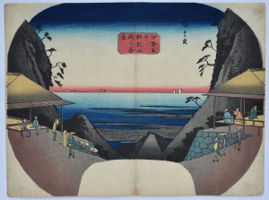
Click here to view image full size.
An uncut fan print from a set of views of Ise: Ise meisho, Asakumayama toge no chamise, “Teahouses on the Mount Asakuma Pass, Famous Places of Ise Province.” Hiroshige used this same view about a decade later for no.7 from the set The Sixty-odd Provinces. He cleverly uses the cliff sides to wrap around the uchiwa-e shape. Published c.1840. Extremely rare: This actual impression illustrated in Hiroshige no uchiwa-e, Unsodo, 2010, p.78, pl.108. Ex collection Maroni with seal at bottom. (His collection was sold at public auction at Kende Galleries, N.Y. 1947-9.)
Fine impression and colour. Centre fold (as often), otherwise very good condition. Signed Hiroshige ga.
Status: Sold
Anonymous (c. 1810)
Click here to view image full size.
An uncut ukie fan print, Edo meisho Eitaibashi, “Eitai Bridge, Edo.” Published by Ibaya Sensaburo, c. early 1800s. Possibly by Utagawa Kunimitsu or Utagawa Kunitora and quite possibly the only recorded impression.
Very good impression and colour. Slight corner soil, otherwise good condition.
Status: Sold
Utagawa HIROSHIGE (1797-1858)
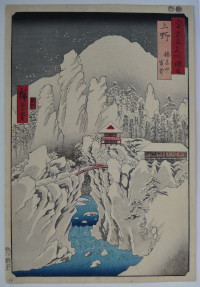
Click here to view image full size.
Kozuke, Harunasan setchu, “Kozuke [Province], Mount Haruna Under Snow.” From a set of 69 prints [Dai Nihon] Rokujuyoshi meisho zue, “Famous Places in the Sixty-odd Provinces [of Japan]” published by Koshihei between 1853 and 1856, this being 1853. A red bridge spans a gorge with precipitous cliffs and a fast flowing river. Fantastic crags point upwards into the sky. In the distance is Mount Haruna – a sleeping volcano.
Very fine impression and colour. Light album backing, otherwise fine condition. Signed Hiroshige ga.
Status: Edit
Takehara SHUNCHOSAI (Fl. c 1772-1818)
Click here to view image full size.
An original painting showing beauties enjoying the cool of the evening on the riverbank and shallows of the Komo-gawa in Kyoto. An exceptional and rare painting by an artist best known for his guides to Osaka and Kyoto, Miyako meisho zue and Naniwa no kagami, published 1778 and 1780. Full colour on silk, 51 x 19.75 in; 129.5 x 50.2 cms. In very good condition. Signed Bunsei tei inoshishi chushu hatsumikka kyoshinioite Shunchosai Takehara Nobushige. Painted 1818.
Status: Sold
Tsuji HOZAN (Fl. 1820-1840)

Click here to view image full size.
An original painting, 31.5 x 12.5 in; 80 x 31.8 cms. Sumi and full colour on silk. The inscription on the inside of the box lid states that the painting is by Tsuji Hozan, a Shijo painter, and shows a “castle-toppling” courtesan under cherry blossom in the style of Toyokuni. (Castle-toppling is a term used for high-ranking courtesans who could, because of their beauty, cause havoc and influence the regimes of men of great power. [See Yoshitoshi’s Women, John Stevenson, Avery Press, 1986, p. 48, no. 10, “Looking feminine” from the set “Thirty-two Aspects.”]) Hozan is known for the fine illustrations to Bitchu meisho-ko (1822) and there is a fine pair of paintings in the BM, acc. no. 1983.1111, 0.3.1-2. However, there is some thought that Hozan was a pseudonyme for Aoi Sokyu (Shuho). Certainly, this pure Ukiyo-e painting shows great competence. Signed Hozan hitsu with seals Hozan and Dojin. In fine condition. Also, on the inside of the lid is a guarantee from Zangetsu’an Studio.
Status: Sold
Nishiyama HOEN (1804-1867)
Click here to view image full size.
An original painting showing the oiran Eguchi on a white elephant. The origins of this story seem to go back to a recorded conversation the poet-monk Saigyo (1118-1190) had with a prostitute named Eguchi giving rise to numerous legends. Eguchi is shown as a manifestation of the Budhisattva Fugen whose usual vehicle is a large white elephant. Hoen, one of the best shijo painters of his time, lived in Osaka and was a pupil of Keibun. Full colour on silk, 36.5 x 13 in; 92.7 x 33 cms. Mount showing signs of wear but image in good condition. Signed Hoen with seal (?) – Seisho.
Status: Sold
Imao KEINEN (1845-1924)
Click here to view image full size.
Probably the best known artist of his time and famous for his realistic depictions of birds and flowers. Two koi or carp swim beneath a rock with an overhanging white mountain rose. Ink, colour, gofun and gold on silk. Original mount with ivory rollers. A double kiri-wood box inscribed by Keinen’s son Keisho with date Showa 13, 1938 and a guarantee of authenticity. He entitles the painting Nobara yuri, “Koi playing under a wild rose.” Image size: 44.5 x 14.5 in; 113 x 36.5 cms. Slight crease, otherwise good condition. Signed Keinen.
Status: Sold
Hosoda EISHI (1756-1829)

Click here to view image full size.
An original painting, full colour on silk, 32.5 x 10 in; 82.5 x 25.5 cms. Shows a promenading courtesan under a full moon – presumably on the way to an assignation. She wears a vivid red over-garment decorated with iris and the under-garment has heavy mica applied. Eishi was of unusually high rank for an Ukiyo-e artist and is noted for his refined beauties – both painted and in woodblock form. They often have ink-wash backgrounds in the Edo-Kano technique learned as a pupil of Kano Eisen’in Michinobu (1730-90). His corpus is extensive and there are also many copies of his work. He had around thirty pupils including Eisho, Eiri and Eisui. Minor flaking of mica but in otherwise good condition. Signed Chobunsai Eishi hitsu with Eishi seal.
Status: Sold
Utagawa HIROSHIGE (1797-1858)
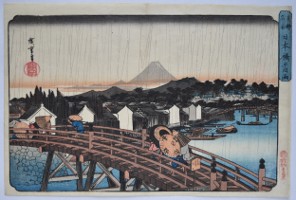
Click here to view image full size.
Nihonbashi no hakuu, “Light Rain on Nihon Bridge.” From a Toto meisho set of 21 designs published between c. 1832 and 1839 by Kikakudo. The set was subsequently enlarged. Shows figures crossing Nihonbashi in rain, one figure carries an umbrella with the publisher’s name. Warehouses in the background and a distant view of Fuji. A beautiful print and very difficult to find in early impression: The title cartouche had a plug inserted beside the bottom three characters of the title on the left. This damage seems to have occurred when the block was cut and over time the spigot gradually slipped out leaving an unprinted area (which is sometimes painted in). In the earliest impressions the plug is hardly visible (as here). Also, the publisher’s seal at the bottom right should be in red, later editions having it in black. There was also an early variant edition with a yellow sky.
Fine impression and colour. Imperceptible centre fold, also near the right edge, otherwise very good condition. Signed Hiroshige ga.
Status: Sold
